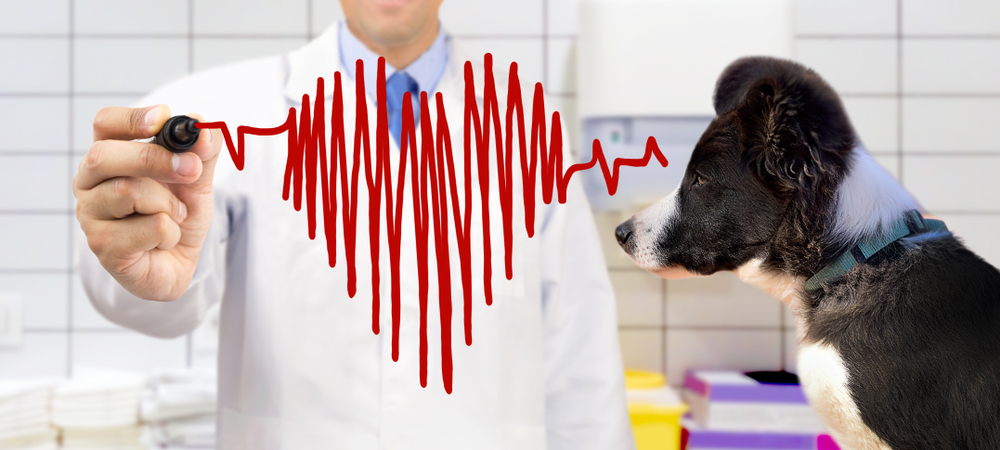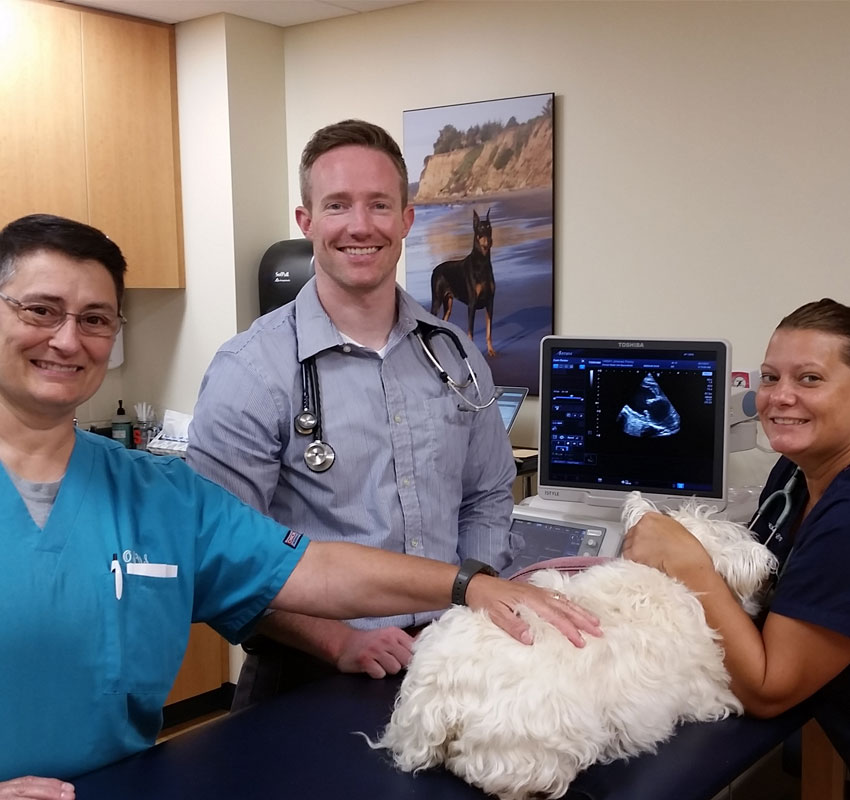Discovering the Necessary Providers Provided by a Veterinary Cardiologist: Understanding Ultrasound and CT Check Strategies
Veterinary cardiologists play a vital role in the health and wellness of pet dogs by detecting and treating different heart disease. They utilize advanced imaging methods, such as cardiac ultrasound and CT scans, to give precise analyses. Each approach has its distinctive benefits and applications. Understanding these techniques is important for animal proprietors looking for the very best treatment for their friends. What factors should family pet proprietors consider when choosing in between these analysis tools?

The Role of Veterinary Cardiologists in Pet Healthcare
Veterinary cardiologists play an important duty in the health care of family pets, focusing particularly on identifying and treating heart-related conditions. They have specialized training that permits them to analyze complicated analysis examinations and recognize different cardio issues. These professionals use sophisticated methods, such as echocardiography and electrocardiography, to evaluate heart feature and framework accurately.Veterinary cardiologists also create tailored treatment plans that may include medicines, way of living modifications, and, in some situations, surgical treatments. Their know-how expands to educating animal owners about heart health and wellness, highlighting the significance of normal examinations and early discovery of possible problems. Cooperation with general veterinarians is essential, as it assures comprehensive look after animals with believed heart problems. By supplying specialized services, vet cardiologists considerably improve the lifestyle for animals and provide peace of mind for their owners, reinforcing the relevance of heart health in overall animal wellness.
Usual Cardiac Issues in Animals
Common cardiac concerns in animals can considerably influence their wellness and top quality of life. Heart whisperings, different kinds of cardiomyopathy, and hereditary heart flaws are amongst the most common conditions that veterinarians run into. CT Scans For Animals. Comprehending these problems is vital for animal owners to assure prompt diagnosis and appropriate treatment
Heart Murmurs in Pets
Heart murmurs can be a resource of problem for animal proprietors, they are not constantly a measure of major health problems. A heart whispering is an irregular sound produced by stormy blood flow within the heart. In animals, these whisperings can be triggered by various variables, including genetic heart flaws, shutoff issues, or even anxiety throughout examinations. Lots of animals with heart whisperings lead regular lives without significant health effects. To establish the underlying reason, veterinary cardiologists commonly use diagnostic techniques such as echocardiograms and Doppler ultrasounds. Early discovery and analysis are essential, as they may assist manage any type of possible cardiac issues efficiently. Family pet proprietors are motivated to consult their vet for an extensive evaluation if a heart whispering is identified.
Cardiomyopathy Kind Explained
Cardiomyopathy encompasses a team of conditions impacting the heart muscle, bring about jeopardized cardiac function in animals. One of the most common kinds consist of expanded cardiomyopathy (DCM), hypertrophic cardiomyopathy (HCM), and limiting cardiomyopathy (RCM) DCM largely influences pets, creating the heart to increase the size of and compromise, which diminishes its ability to pump blood efficiently. On the other hand, HCM is extra widespread in pet cats, characterized by the enlarging of the heart walls, commonly leading to obstructed blood flow. RCM, though much less common, happens when the heart muscle mass ends up being rigid, restricting its capability to fill with blood. Each type offers special challenges in diagnosis and therapy, requiring specialized veterinary cardiological analysis to ensure peak management and take care of affected animals.
Congenital Heart Problems
Genetic heart problems stand for a significant group of heart issues in animals, distinct from obtained conditions such as cardiomyopathy - Board Certified Veterinary Cardiologist. These issues are structural problems present at birth, affecting the heart's normal function. Usual types consist of patent ductus arteriosus, ventricular septal issues, and pulmonic constriction. Signs might vary commonly, ranging from mild to serious, and can consist of exercise intolerance, coughing, and problem breathing. Early diagnosis via advanced imaging methods like ultrasound is important for efficient monitoring. Veterinary cardiologists play an essential function in identifying these problems and advising proper therapy options, which may consist of medical administration or surgical treatment. Identifying genetic heart problems permits far better outcomes and improved high quality of life for influenced family pets
Understanding Cardiac Ultrasound: Just How It Functions
A significant number of veterinary methods currently utilize cardiac ultrasound as a vital analysis device for evaluating heart health and wellness in pets. This non-invasive technique uses high-frequency acoustic waves to produce pictures of the heart's framework and feature. During the procedure, a vet service technician applies a gel to the animal's breast and utilizes a transducer to emit ultrasound waves. These waves bounce off the heart and surrounding structures, producing real-time photos on a monitor.Veterinarians can examine numerous facets of heart health and wellness, including navigate to this website chamber dimension, wall motion, and valve feature. In addition, heart ultrasound allows for the detection of problems such as liquid buildup and genetic heart flaws. This method is essential for detecting conditions that may not show up through basic radiographs. By providing detailed details concerning the heart's makeup and performance, heart ultrasound help in creating efficient treatment plans for pets experiencing heart problem.
The Value of CT Scans in Identifying Heart Conditions
Just how do CT scans enhance the medical diagnosis of heart problems in veterinary medicine? CT scans supply in-depth cross-sectional images of the heart and bordering frameworks, enabling veterinarians to visualize intricate physiological relationships. This imaging strategy is specifically advantageous in identifying congenital heart defects, cardiac growths, and irregularities in capillary. By using innovative imaging formulas, CT scans can analyze heart chamber sizes and function, supplying an extensive view that may be difficult to attain with traditional methods.Additionally, CT angiography can envision blood flow and identify locations of stenosis or blockage, which is essential for preparing possible treatments. The speed and precision of CT scans likewise facilitate quick medical diagnoses, essential in emergency scenarios. Eventually, the unification of CT scans into vet cardiology significantly boosts the precision of medical diagnoses, enabling targeted treatment strategies and boosting client outcomes for pets experiencing heart problems.
Comparing Ultrasound and CT Check Strategies
While both ultrasound and CT scans are indispensable devices in vet cardiology, they offer unique advantages and constraints that affect their usage in identifying heart disease. Ultrasound, or echocardiography, gives real-time imaging of the heart's framework and feature, permitting vets to examine heart chambers, shutoffs, and blood circulation. It is specifically effective for assessing conditions like heart disease and cardiomyopathy. Ultrasound might be restricted in picturing particular anatomical structures due to client size or obesity.In comparison, CT scans offer detailed cross-sectional images of the heart and bordering cells, making them suitable for recognizing architectural abnormalities, growths, or vascular problems. Although CT visit this site right here scans supply complete understandings, they call for sedation and may involve radiation exposure. Ultimately, the selection in between ultrasound and CT scans relies on the details scientific situation, the patient's problem, and the info needed for an exact medical diagnosis.
Treatment Alternatives Readily Available With Vet Cardiology
Vet cardiology provides a range of therapy choices tailored to attend to numerous heart disease in animals. Therapy plans usually begin with lifestyle adjustments, including diet plan modifications and workout modifications, targeted at enhancing overall heart wellness. Drugs play a crucial duty, with cardiologists recommending medications such as diuretics, beta-blockers, and ACE inhibitors to handle symptoms and improve heart function.In extra serious cases, interventional treatments, such as balloon valvuloplasty or stent positioning, may be needed to alleviate blockages or enhance blood circulation. For sure genetic heart problems, medical alternatives may be checked out to remedy architectural concerns. Additionally, continuous surveillance and follow-up care are necessary parts of an extensive therapy strategy, permitting prompt changes based upon the pet's reaction to treatment. On the whole, vet cardiology focuses on supplying efficient, customized treatment to optimize the health and well-being of pet patients with heart conditions.
Exactly how to Prepare Your Animal for a Heart Examination
Preparing a pet for a cardiac analysis is vital to assure exact outcomes and a smooth procedure. Proprietors need to first schedule the appointment with the vet cardiologist and review any type of details needs or concerns. It is advisable to keep food for at the very least 12 hours before the examination, as this assists improve imaging high quality during procedures like ultrasound or CT scans.Additionally, maintaining a tranquil setting on the day of the consultation can aid lower the family pet's stress and anxiety. It is advantageous to bring along any type of relevant medical documents, consisting of previous examinations and medicines (Board Certified Veterinary Cardiologist). Proprietors need to likewise make certain that their pet is comfy and leashed throughout transport to the facility. Acquainting themselves with the examination procedure can minimize fears and aid in asking notified concerns during the appointment. By complying with these steps, owners can add considerably to the effectiveness of the heart evaluation
Frequently Asked Concerns
How much time Does a Heart Ultrasound or CT Scan Take?
The duration of a cardiac ultrasound commonly varies from 30 to 60 mins, while a CT check might take about 15 to 30 mins. Factors such as the individual's condition can affect these time quotes.

Exist Any Kind Of Risks Associated With These Diagnostic Treatments?

Can I Remain With My Family Pet Throughout the Procedure?
The veterinary facility's policy usually determines whether pet dog owners can remain throughout procedures. While some facilities urge proprietor existence for comfort, others might need separation to ensure safety and security and ideal problems for analysis imaging.
Just how much Do These Analysis Examinations Normally Expense?
The costs of analysis examinations, such as ultrasound and CT scans, typically differ based on location and center. Typically, costs range from a couple of hundred to over a thousand dollars, reflecting the intricacy and modern technology entailed.
What Is the Recovery Refine After a Cardiac Evaluation?
The recuperation procedure after a cardiac evaluation entails keeping track of the pet for any instant responses, ensuring comfort, and restricting physical task. Vets commonly supply post-evaluation guidelines to assist pet dog owners throughout this important recovery duration. Heart whisperings, different types of cardiomyopathy, and congenital heart issues are among the most widespread problems that veterinarians come across. A heart murmur is an uncommon noise produced by stormy blood circulation within the heart. Cardiomyopathy encompasses a group of diseases impacting the heart muscular tissue, leading to jeopardized heart feature in animals. Hereditary heart defects stand for a significant category of cardiac issues in pet dogs, distinct from obtained problems such as cardiomyopathy. Ultrasound, or echocardiography, gives real-time imaging of the heart's structure and read this function, enabling vets to analyze heart chambers, valves, and blood flow.